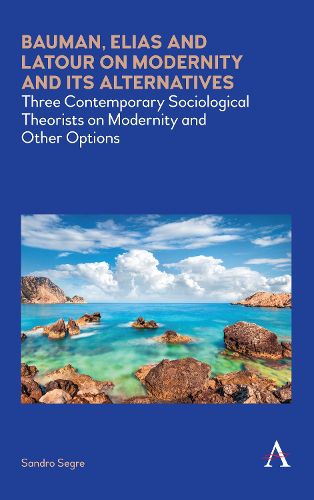Readings Newsletter
Become a Readings Member to make your shopping experience even easier.
Sign in or sign up for free!
You’re not far away from qualifying for FREE standard shipping within Australia
You’ve qualified for FREE standard shipping within Australia
The cart is loading…






A comparison of the sociological works of three contemporary authors on modernity and its alternatives.
Bauman, Elias and Latour on Modernity and Its Alternatives provides a comparison between the conceptions of modernity and its alternatives in the works of Bauman, Elias and Latour. Their work and research are linked to their distinct views on modernity and its alternatives. For Bauman, the rationality, effectiveness and impersonality that characterize present-day bureaucratic apparatuses are the distinguishing features of modernity. Its post-modern or ‘liquid’ alternative has none of these traits. For Elias, modernity has two different and contrasting faces, that of civilization and barbarity. Elias conceives of civilization as a process connoted by self-control and pacification, which prevail as a consequence of the restraint which honor and morality exert on individuals. By contrast, the breakdown of civilization involves barbarity. For Latour, modernity if defined by a separation between society and nature, or humans and non-humans, has never existed. By virtue of their intimate association, humans and non-humans have formed hybrids, whose proliferation is the hallmark of our age. Modernity, therefore, has never prevailed. Alternatives to hybrids are, in the current age, failed hybrids. The set of alternatives is then as follows: modernity vs. post-modernity (Bauman); civilization vs. barbarity (Elias); and successful vs. unsuccessful hybrids (Latour).
$9.00 standard shipping within Australia
FREE standard shipping within Australia for orders over $100.00
Express & International shipping calculated at checkout
A comparison of the sociological works of three contemporary authors on modernity and its alternatives.
Bauman, Elias and Latour on Modernity and Its Alternatives provides a comparison between the conceptions of modernity and its alternatives in the works of Bauman, Elias and Latour. Their work and research are linked to their distinct views on modernity and its alternatives. For Bauman, the rationality, effectiveness and impersonality that characterize present-day bureaucratic apparatuses are the distinguishing features of modernity. Its post-modern or ‘liquid’ alternative has none of these traits. For Elias, modernity has two different and contrasting faces, that of civilization and barbarity. Elias conceives of civilization as a process connoted by self-control and pacification, which prevail as a consequence of the restraint which honor and morality exert on individuals. By contrast, the breakdown of civilization involves barbarity. For Latour, modernity if defined by a separation between society and nature, or humans and non-humans, has never existed. By virtue of their intimate association, humans and non-humans have formed hybrids, whose proliferation is the hallmark of our age. Modernity, therefore, has never prevailed. Alternatives to hybrids are, in the current age, failed hybrids. The set of alternatives is then as follows: modernity vs. post-modernity (Bauman); civilization vs. barbarity (Elias); and successful vs. unsuccessful hybrids (Latour).